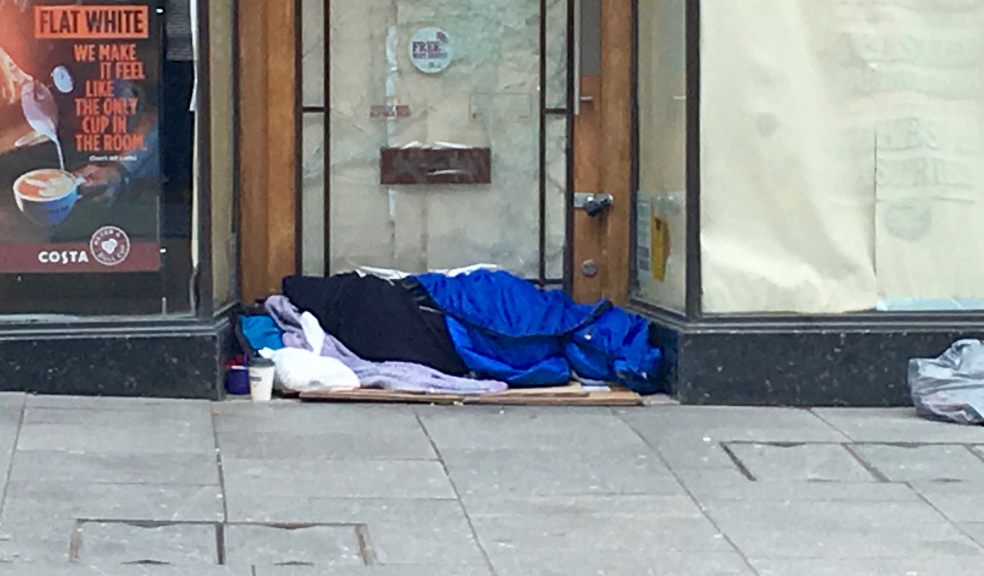
Exeter and Teignbridge councils launch Homelessness Awareness Week
Exeter and Teignbridge councils are stepping up their homelessness support with a new campaign aimed at highlighting all the good work that goes on in the area and raising awareness of the issue.
The two councils have teamed up to launch Homelessness Awareness Week which runs from 9 to 13 October. The social media campaign is focused around a theme of help.
Over five days, both councils will be highlighting what help there is for people, how they can go about getting support, how people who aren’t homeless can help and the success stories of those who have turned their lives around.
During the week, starting on Monday, videos will be posted on Facebook and Twitter showing what work goes on in Exeter and Teignbridge to tackle homelessness.
Daily posts will highlight how the councils work to prevent homelessness occurring, with early interventions and close partnership working.
The posts will shine a light on the work carried out by a host of agencies including:
- St Petrocks
- Julian House
- Exeter CVS & CoLab
- Young Devon
- YMCA
- Splitz
- Gabriel House
- Esther Community
- Community Housing Aid
- Citizens Advice Bureau (CAB)
- Homemaker Southwest
- Prison Services
- Westward Housing
- Independent Futures
- HITS and THAT
The week will finish with a drop-in event at Exeter Guildhall on Friday 13 October, where people will be able to pop in between 12 and 2pm and find out more about how the councils and its partners are tackling homelessness.
Cllr Emma Morse, Exeter City Council’s Lead Councillor for People, said: “As a local authority we are 100% committed to tackling homelessness.
“The common perception of homelessness is rough sleeping, as this is the most visible form of homelessness, but it accounts for only 5% of those who don’t have a real home,” she stressed. “Street dependent people are just the tip of the iceberg when it comes to homelessness.
“Many people think being homeless will never happen to them, but the reality is it can and it often does,” said Cllr Morse. “Relationships break down, people find themselves without a job, they lose their home and things take a rapid spiral down.
“Our job is to ensure we have adequate provision in the city to deal with these issues and to get people back on their feet again. Not one agency has the answer, homelessness will only be prevented by working together and in partnership.”
Cllr Humphrey Clemens, Teignbridge District Council’s executive portfolio holder for housing and planning said: “The issues of homelessness are often complex and traumatic and can affect anyone at any time.
“Shelter is one of life’s essentials and as a council we have a strong track record in preventing homelessness, supporting those in desperate need and reducing its impact where it cannot be prevented. The conversion of a former doctor’s surgery in Newton Abbot into temporary accommodation for local homeless households is an example of policy in action.
“Teignbridge has a clear, long-term strategy to meet its housing challenges and obligations in many ways. We hope this campaign will help draw people’s attention to the issue, start conversations about what support there is or even galvanise people in taking action.”
While there are some differences between Exeter and Teignbridge in the experience of homelessness, the causes and available solutions are the same.
In an innovative approach that cuts across political and administrative boundaries, Teignbridge and Exeter adopted a joint homelessness action plan 2016-2020 that focuses on partnership, prevention and tackling rough sleeping.
Both authorities recognised that by working together, they can establish better and more efficient services and develop clearer, more accessible pathways for clients, stakeholders and residents.
The shared vision for action helps develop a more holistic conversation with partners, service providers and the public who often do not recognise local authority boundaries. It also offers targeted coverage at a local level where it’s needed, from any rough sleeping in urban areas to those facing homelessness in a rural and more isolated setting in smaller villages.

















